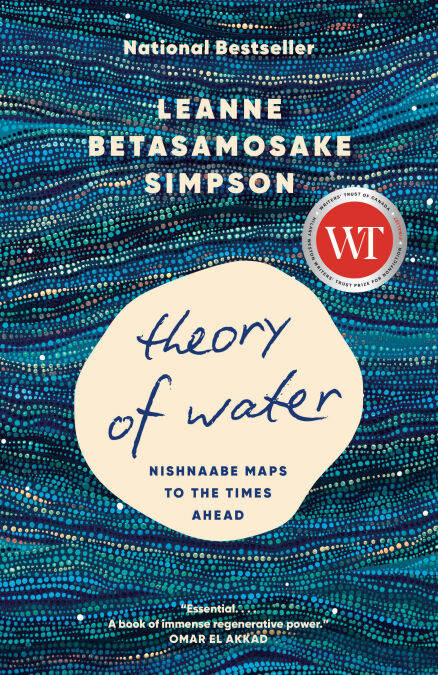
- Afhalen na 1 uur in een winkel met voorraad
- Gratis thuislevering in België vanaf € 30
- Ruim aanbod met 7 miljoen producten
- Afhalen na 1 uur in een winkel met voorraad
- Gratis thuislevering in België vanaf € 30
- Ruim aanbod met 7 miljoen producten
Zoeken
Theory of Water E-BOOK
Nishnaabe Maps to the Times Ahead
Leanne Betasamosake Simpson
E-book | Engels
€ 34,50
+ 34 punten
Omschrijving
NATIONAL BESTSELLER • WINNER OF THE 2025 WRITERS’ TRUST PRIZE FOR NONFICTION • A CBC Best Canadian Nonfiction Book of 2025 • The Hill Times’ Top 100 Best Books in 2025
Acclaimed Nishnaabeg writer Leanne Betasamosake Simpson takes a revolutionary look at that most elemental force, water, and suggests a powerful path for the future.
For many years, Leanne Betasamosake Simpson has found refuge in skiing—in all kinds of weather across different forms of terrain, often following the trail beside a beloved creek near her home. Recently, as she skimmed along this path and meditated on our world's uncertainty—including environmental devastation, the rise of authoritarianism, and the effects of ongoing social injustice—her mind turned to the ice beside her, and the snow beneath her feet. And she asked herself: What might it mean to truly listen to water? To know not only the land on which we live, but the water that surrounds and inhabits us? To coexist with and alongside water?
So begins this renowned writer's quest to discover, understand, and trace the historical and cultural interactions of Indigenous peoples with water in all its forms. On her journey, she reflects on the teachings, traditions, stories, and creative work of others in her community—particularly those of her longtime friend Doug Williams, an Elder whose presence suffuses these pages; reads deeply the words of thinkers from other communities whose writing expands her own; and begins to shape a "Theory of Water" that reimagines relationships among all beings and life-forces.
In this essential and inventive work, Simpson artfully weaves Nishnaabeg stories with her own thought and lived experience—and offers a vision of water as a catalyst for transformation, today and into our shared future.
Acclaimed Nishnaabeg writer Leanne Betasamosake Simpson takes a revolutionary look at that most elemental force, water, and suggests a powerful path for the future.
For many years, Leanne Betasamosake Simpson has found refuge in skiing—in all kinds of weather across different forms of terrain, often following the trail beside a beloved creek near her home. Recently, as she skimmed along this path and meditated on our world's uncertainty—including environmental devastation, the rise of authoritarianism, and the effects of ongoing social injustice—her mind turned to the ice beside her, and the snow beneath her feet. And she asked herself: What might it mean to truly listen to water? To know not only the land on which we live, but the water that surrounds and inhabits us? To coexist with and alongside water?
So begins this renowned writer's quest to discover, understand, and trace the historical and cultural interactions of Indigenous peoples with water in all its forms. On her journey, she reflects on the teachings, traditions, stories, and creative work of others in her community—particularly those of her longtime friend Doug Williams, an Elder whose presence suffuses these pages; reads deeply the words of thinkers from other communities whose writing expands her own; and begins to shape a "Theory of Water" that reimagines relationships among all beings and life-forces.
In this essential and inventive work, Simpson artfully weaves Nishnaabeg stories with her own thought and lived experience—and offers a vision of water as a catalyst for transformation, today and into our shared future.
Specificaties
Betrokkenen
- Auteur(s):
- Uitgeverij:
Inhoud
- Aantal bladzijden:
- 224
- Taal:
- Engels
Eigenschappen
- Productcode (EAN):
- 9781039010253
- Verschijningsdatum:
- 21/04/2025
- Uitvoering:
- E-book
- Beveiligd met:
- Adobe DRM
- Formaat:
- ePub

Alleen bij Standaard Boekhandel
+ 34 punten op je klantenkaart van Standaard Boekhandel
Beoordelingen
We publiceren alleen reviews die voldoen aan de voorwaarden voor reviews. Bekijk onze voorwaarden voor reviews.







